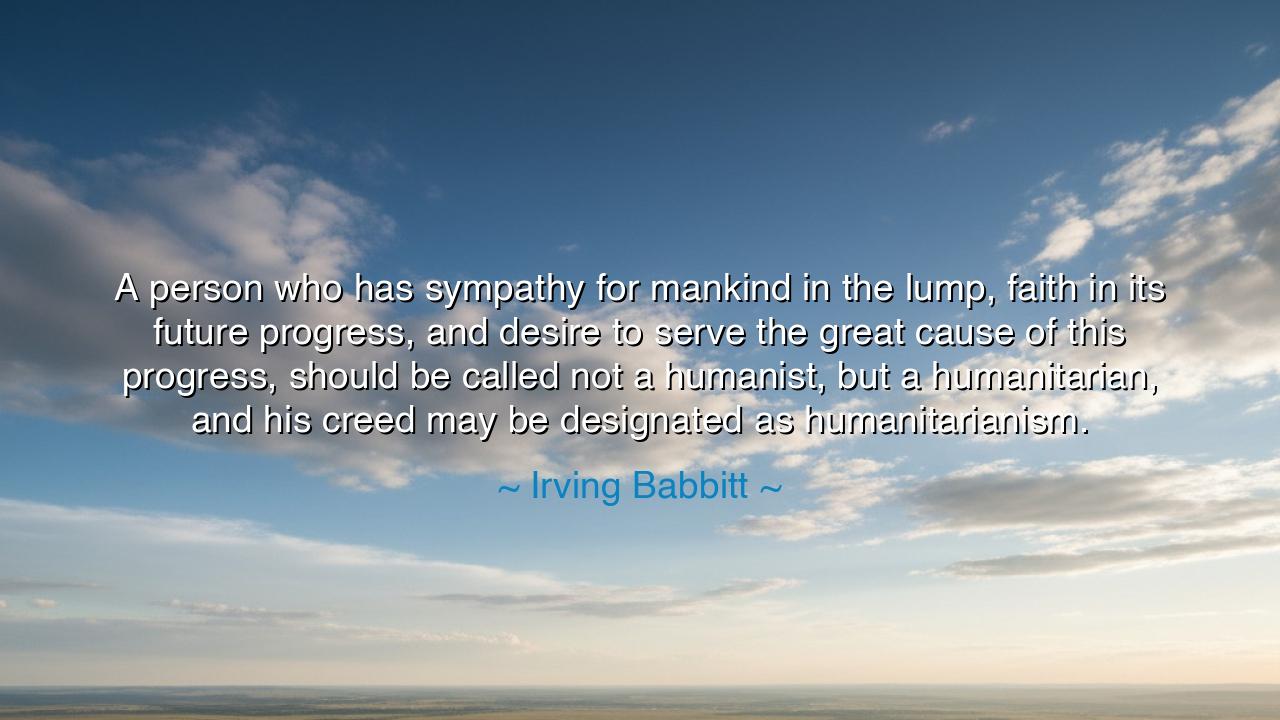
A person who has sympathy for mankind in the lump, faith in its
A person who has sympathy for mankind in the lump, faith in its future progress, and desire to serve the great cause of this progress, should be called not a humanist, but a humanitarian, and his creed may be designated as humanitarianism.






When Irving Babbitt proclaimed, “A person who has sympathy for mankind in the lump, faith in its future progress, and desire to serve the great cause of this progress, should be called not a humanist, but a humanitarian, and his creed may be designated as humanitarianism,” he was drawing a line as sharp as a blade between two visions of the human spirit. In his words, humanism is bound to the individual, to the cultivation of the mind and character of man, while humanitarianism rises as a larger flame, one that looks to the whole of mankind, to its future progress, to the great march of civilization itself.
The origin of this thought is rooted in the struggle of modernity. In the age of Babbitt, men were questioning what it meant to be moral, what it meant to be devoted to humanity. The humanist sought excellence in the individual—wisdom, restraint, virtue, discipline—while the humanitarian looked outward, yearning to heal the world’s wounds, to labor not for one’s own refinement, but for the elevation of all. In his quote, Babbitt does not diminish one in favor of the other; rather, he names them for what they are. The one is the gardener of the self, the other the builder of the collective future.
The ancients too knew this distinction. Consider the life of Marcus Aurelius, who cultivated the soul through Stoic discipline, a true humanist in Babbitt’s sense. Yet consider also Florence Nightingale, who, centuries later, stood amid the wounded of the Crimean War. She was not concerned with polishing her own soul through quiet meditation alone, but with binding the wounds of men, reforming hospitals, and giving her strength to the great cause of progress. Here lies the heart of humanitarianism: to act not only for one’s own perfection, but for the healing and advancement of mankind.
Yet this creed is no easy path. To have sympathy for mankind in the lump means to love not only the neighbor who is kind, but also the stranger, the outcast, even the enemy. It means to bear faith in a future progress that may be far beyond our lifetime. The humanitarian must walk with patience, for the road of progress is long and often unseen. He must labor as the farmer does, knowing the harvest may belong to another generation. His vision is not bound by the narrow span of his own life, but stretched across centuries, across nations, across the destiny of humanity itself.
The lesson is profound: the calling of the humanitarian is to stand not only for the self, but for the multitude. The humanist asks, “How may I perfect my soul?” The humanitarian asks, “How may mankind be lifted, healed, and guided?” Both questions are noble, but Babbitt reminds us that they are different creeds, and that the one who devotes himself to the service of the great cause of humanity should not be mistaken for one who merely seeks inner cultivation.
What then must we do? First, we must name our path clearly. If your calling is to cultivate wisdom and virtue in your own heart, then walk as the humanist. If your heart burns to serve the future of mankind, then take upon yourself the mantle of humanitarianism. Second, we must remember that progress requires sacrifice. Do not look only for immediate reward, but for the unseen good your actions may plant for generations to come. Third, learn to hold sympathy for mankind in the lump, even when individuals fail you—for it is the race itself, stumbling and rising, that the humanitarian loves.
And finally, let Babbitt’s words echo in your heart: to live for oneself is noble, but to live for the progress of mankind is greater still. The world is in need not only of sages, but of servants; not only of thinkers, but of doers. Choose, therefore, to give of your gifts, not for glory, but for the future. In this way, you may become not only a seeker of wisdom, but a torchbearer for the endless journey of humanity itself.






AAdministratorAdministrator
Welcome, honored guests. Please leave a comment, we will respond soon